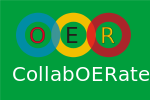Opportunities and threats
From WikiEducator
Opportunities
- Open means we can design better assessments
- "Redesign" of the OER university can transfer back to improve "conventional" approaches
- Social networks allow sharing of knowledge and locating of subject experts
- Open education encourages the design of adaptive learning environments and content, which can meet the varying learning needs of multiple learners
- Many experts available to teach, not reliant on one teachers perspective, deeper learning opportunity
- Collaborative and project based learning becomes possible
- Open education encourages the design of adaptive learning environments and content, which can meet the varying learning needs of multiple learners
- Effective communication of value proposition for institutions
- Different approaches for small island states (eg printed materials)
- SPC supportive of ICT and OER approaches
- Provides opportunity to widen access in systems where access to tertiary education is capped
- Widen access to 4X more learners for the same amount of money (taxpayer dollars)
- Provides more choices for students
- Central coordination for students who want to develop Prior Learning Assessment PLARS
- Teach/Learn self-directed learning processes that will last a life time.
- Development of means for indigenous languages and wisdom to be used for formal credentials.
- An amazing opportunity for people all around the world to work together and attain cultural competence.
- Seeking to tap into the 'Service' component of individual academics' employment roles, even if their employer doesn't support OER institutionally
Threats
- Where is the teacher - -who guides the learner? How do we integrate robust pedagogy?
- Buy-in from faculty is mission critical. Academics need time.
- We are assuming that learners want this kind of learning
- Can learners afford the technology (cost of computers and connectivity)
- Resources under non-copyleft license
- A lack of learner awareness about the opportunities available through Open Education may hinder its uptake
- Without participation and engagement from National qualifications authority -- OER university concept will not work
- OER and reduced enrolment? Why would institutions do this.
- Inability to see the requirement of OER by the traditional mindset, since they do not sense any threat, and they continue to find enough consumers (students)
- A lack of academic (teacher)awareness about OER and resistance to step outside current delivery/assessment models
- Traditional educational models fear of change and resistance to "open" educational options
- Worldwide shortage of instructional designers, even more important in online learning than in traditional classrooms.
- Few people skilled in the pedagogy involved in self-directed learning, learning contract development etc.
- Need to develop legitimate means of evaluating learning especially means of proctoring exams, assuring that the learning belongs to the person who claims it.
- Challenge of explaining a number of complex concepts: self-directed learning, learning plans, educational portfolios etc. in asychronously
- Challenge of enabling students to master their use of time (self-regulation of learning).
- Addition of a "human element" to encourage persistence,provide guidance, and stave off loneliness
- Convincing not only students, but their families, employers,governments etc. that the self-directed use of learning resources and portfolio development is worth it especially in a world where online degrees have just recently gained credibility
- Enabling students to separate the OER-U and its participating institutions from diploma mills that sell credentials.
- Perpetuation of a predominantly Western,'one size fits all' approach to education
- Use of OERs as product rather than as the vehicle for a participatory, capacity-building process
